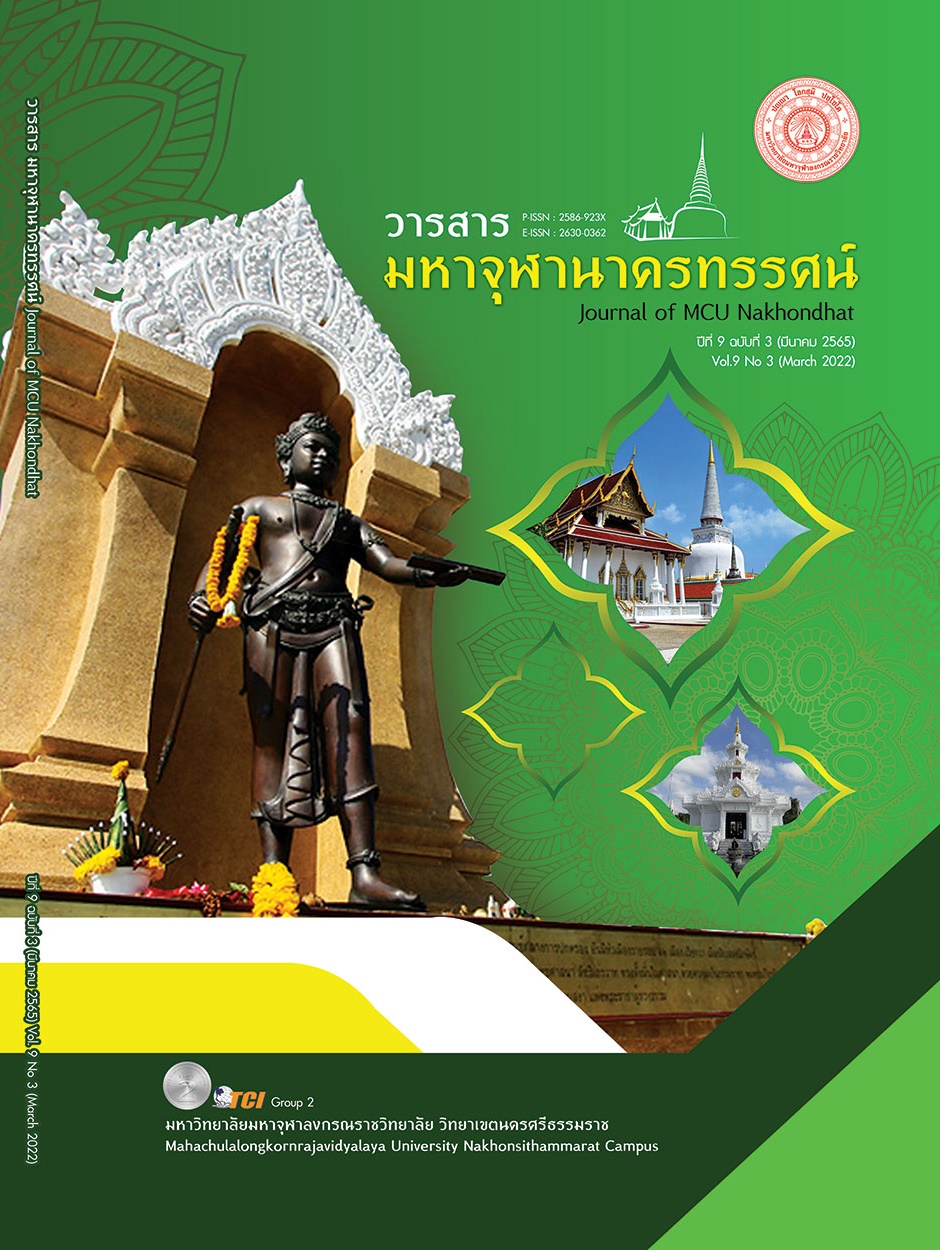THE DEVELOPMENT OF AN INTEGRATED LEARNING EXPERIENCE MANAGEMENT MODEL BASED ON THE CONCEPT BRAIN BASED LEARNING (BBL) AND PROBLEM BASED LEARNING (PBL) TO PROMOTE CREATIVITY OF EARLY CHILDHOOD KINDERGARTEN YEAR 1
Main Article Content
Abstract
The objectives of this paper were to 1) study the basic information for the development of the learning experience model, 2) develop the learning experience model, 3) experiment with the learning experience model, and to 4) evaluate the model. The model for organizing learning experiences based on brain – based learning combines the concept of problem-based learning to promote creativity of early childhood using a research and development model, divided into 4 steps: 1) the study of preliminary data and related theories, 2) model development, 3) model experimentation, and 4) assessment of learning experience model. The sample consisted of 23 students in Kindergarten Year 1 at Mueang Tha Kham Municipal School 4, Surat Thani Province, in the first semester of the academic year 2020, by purposive sampling. Research tools include a learning management plan. and creativity test The statistics used to analyze the data were mean, standard deviation. and t-test statistics. The results showed that 1) early childhood children developed creativity. Overall, it is at the level that needs to be improved. The children lacked self-confidence and did not dare to express it. 2) The learning experience management style be appropriate 3) The experimental results used the model of experience management according to the brain theory as a base for combining the concept of problem-based learning. To promote creativity of early childhood The efficiency criteria were 74.81/74.44, 77.86/79.63 and 83.88/86.11, respectively, and 4) the evaluation of early childhood creativity. Kindergarten year 1 that learns with a brain-based theory-based experience management model that combines the concept of problem-based learning. After class is higher than before. statistically significant at the .05 level.
Article Details

This work is licensed under a Creative Commons Attribution-NonCommercial-NoDerivatives 4.0 International License.
References
Torrance, E. P. (1963). Education and the creative potential. Minneapolis: The Lund Press.
กนกวรรณ ไกรสุทธิ์. (2558). การเปรียบเทียบผลสัมฤทธิ์ทางการเรียนวิทยาศาสตร์ระหว่างการจัดการเรียนรู้โดยใช้ปัญหาเป็นฐาน (PBL) กับการจัดการเรียนรู้แบบปกติของนักเรียนชั้นประถมศึกษาปีที่ 5 โรงเรียนบ้านย่านตาขาว จังหวัดตรัง. ตรัง: มหาวิทยาลัยรามคำแหง.
กระทรวงศึกษาธิการ. (2560). หลักสูตรการศึกษาปฐมวัย พุทธศักราช 2560. (พิมพ์ครั้งที่ 1). กรุงเทพมหานคร: กระทรวงศึกษาธิการ.
จันทร์เพ็ญ พันธ์อินป้อ. (2561). การพัฒนาการจัดประสบการณ์โดยใช้ปัญหาเป็นฐาน (PBL) เพื่อส่งเสริมทักษะกระบวนการคิดพื้นฐานของเด็กปฐมวัย. เรียกใช้เมื่อ 24 ธันวาคม 2563 จาก https://www.kroobannok.com/board_view.php?b_id=171314
ชุลีกร จันทรโคตร. (2559). การพัฒนาชุดการจัดประสบการณ์การเรียนรู้แบบจิตปัญญาร่วมกับการเรียนรู้โดยใช้สมองเป็นฐาน (BBL) เพื่อเสริมสร้างพัฒนาการและความเชื่อมั่นในตนเองสำหรับเด็กปฐมวัย. ศูนย์เครือข่ายโพนสามัคคี สังกัดสำนักงานเขตพื้นที่การศึกษาประถมศึกษาสกลนคร เขต 1. เรียกใช้เมื่อ 15 มกราคม 2563 จาก https://gsmis.snru.ac.th/e-thesis/file_att1/2018010457421231123_abs.pdf
ดารนี ภู่ทอง. (2560). การพัฒนากิจกรรมการจัดประสบการณ์การเรียนรู้แบบสืบเสาะหาความรู้โดยใช้สมองเป็นฐานที่มีต่อทักษะกระบวนการทางวิทยาศาสตร์ของเด็กปฐมวัยชั้นอนุบาลปีที่ 1 โรงเรียนเอกชน. เขตสายไหม กรุงเทพมหานคร. เรียกใช้เมื่อ 15 มกราคม 2563 จาก http://www.northbkk.ac.th/research_/themes/downloads/abstract/1590365759_abstract.pdf
บุญชม ศรีสะอาด. (2554). หลักการวิจัยเบื้องต้น. (พิมพ์ครั้งที่ 9). กรุงเทพมหานคร: สุวิริยาสาส์น.
สุภีร์ คำแสน. (2560). การจัดประสบการณ์พัฒนาด้านสติปัญญาตามแนวคิดการเรียนรู้ โดยใช้สมองเป็นฐาน (Brain - Based Learning) สำหรับเด็กปฐมวัยชั้นปีที่ 1. ศูนย์พัฒนาเด็กเล็กเคียงศิริบ้านโพธิ์ทอง. เรียกใช้เมื่อ 15 มกราคม 2563 จาก http://www.abt.in.th/_files_aorbortor/071733/news/071733_0_20200612-110846.pdf
สุรารักษ์ แก้วชะมอญ. (2563). การจัดประสบการณ์การเรียนรู้โดยใช้ปัญหาเป็นฐานด้วยเทคนิคการเสริมแรงบวกผ่านการเล่า นิทานเพื่อพัฒนาพฤติกรรมด้านคุณธรรมและจริยธรรมของเด็กระดับชั้นปฐมวัย. วารสารรังสิตบัณฑิตศึกษาในกลุ่มธุรกิจและสังคมศาสตร์, 6(2), 136-149.
Bilal D. (2010). The Effects of Brain-Based Learning on the Academic Achievement of Students with Different Learning Styles Educational Sciences. เรียกใช้เมื่อ 15 มกราคม 2563 จาก https://files.eric.ed.gov/fulltext/EJ919873.pdf
Ozden & Gultekin. (2008). การเปรียบเทียบผลสัมฤทธิ์ทางการเรียนเรื่อง วัฒนธรรมน่ารู้และความฉลาดทางอารมณ์ ของนักเรียนชั้นประถมศึกษาปีที่ 2 ระหว่างการจัดการเรียนรู้ตามแนวคิด โดยใช้ สมองเป็นฐาน (BBL) กับการเรียนรู้ด้วยกลุ่มร่วมมือแบบ jigsaw II. เรียกใช้เมื่อ 15 มกราคม จาก https://so03.tci-thaijo.org/index.php/npuj/article/view/44421


